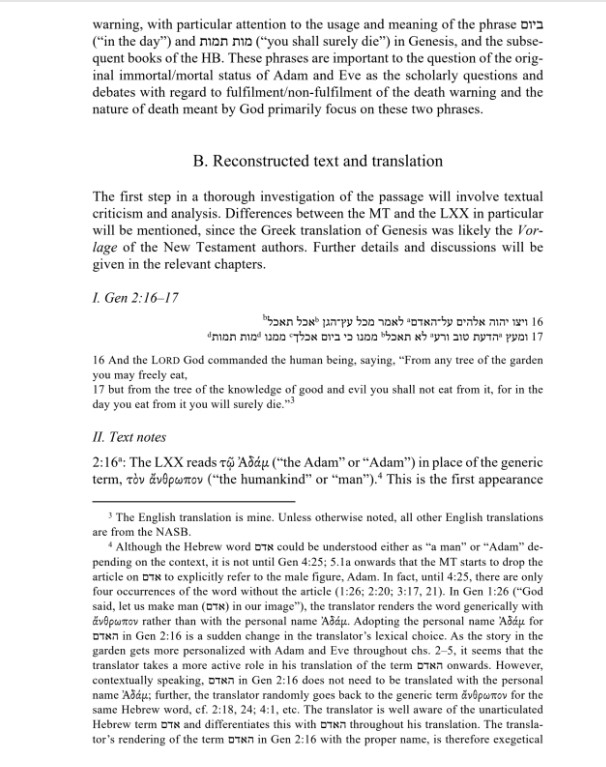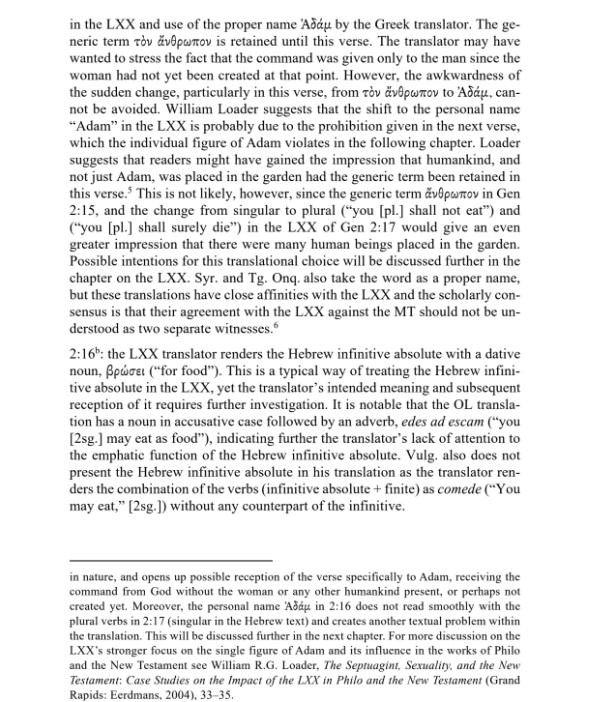Chris W. Lee discusses Hebrew "(Adam" meaning "a man" or "Adam" in the Hebrew and its translation as 'Αδαμ (Adam) or ανθρωπος (man) in the Septuagint.
- Type
- Book
- Source
- Chris W. Lee Non-LDS
- Hearsay
- DirectSecondary
- Reference
Chris W. Lee, Death Warning in the Garden of Eden (Forschungen zum Alten Testament. 2. Reihe 115; Tübingen: Mohr Siebeck, 2020), 14-15n4
- Scribe/Publisher
- Mohr Siebeck
- People
- Chris W. Lee
- Audience
- Reading Public
- Transcription
Although the Hebrew word אדם could be understood either as “a man” or “Adam” depending on the context, it is not until Gen 4:25; 5:1a onwards that the MT starts to drop the article on אדם to explicitly refer to the male figure, Adam. In fact, until 4:25, there are only four occurrences of the word without the article (1:26; 2:20; 3:17, 21). In Gen 1:26 (“God said, let us make man (אדם) in our image”), the translator renders the word generically with ανθρωπον rather than with the personal name ‘Αδαμ. Adopting the personal name ‘Αδαμ for האדם in Gen 2:16 is a sudden change in the translator’s lexical choice. As the story on the garden gets more personalized with Adam and Eve throughout chs. 2-5, it seems that the translator takes a more active role in his translation of the term האדם onwards. However, contextually speaking, האדם in Gen 2:16 does not need to be translated with the personal name ‘Αδαμ; further, the translator randomly goes back to the generic term ανθρωπον for the same Hebrew word, cf. 2:18, 24; 4:1, etc. The translator is well aware of the unarticulated Hebrew term אדם and differentiates this with האדם throughout his translation. The translator’s rendering of the term האדם in Gen 2:16 with the proper name, is therefore exegetical in nature, and opens up possible reception of the verse specifically to Adam, receiving the command from God without the woman or any other humankind present, or perhaps not created yet. Moreover, the personal name ‘Αδαμ in 2:16 does not read smoothly with the plural verbs in 2:17 (singular in the Hebrew text) and creates another textual problem with the translation.
- Citations in Mormonr Qnas
The B. H. Roberts Foundation is not owned by, operated by, or affiliated with the Church of Jesus Christ of Latter-day Saints.


